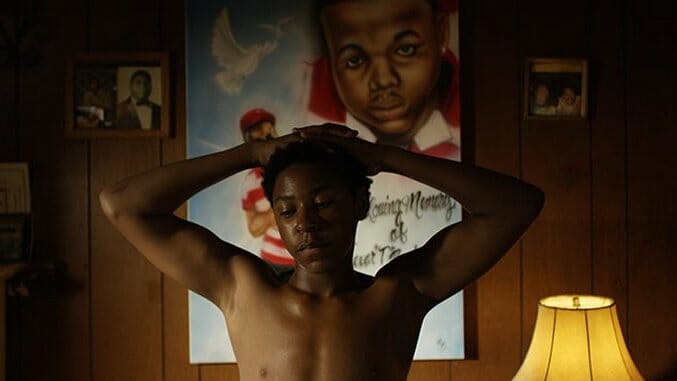
“…stupid house,” Dayveon (Devin Blackmon) lists as he rides his bike aimlessly through his rural Arkansas town, beginning the film that bears his name with the kind of flippant cynicism that seems right for a 13-year-old. Dustin Lane’s cinematography floats Dayveon in the center of the 4:3 screen, buoyed by a world of humidity. “Stupid tree. Stupid rock. Stupid concrete,” he goes on in voiceover, under his breath but fed up. “Stupid people.” His cynicism is infectious—not that such cynicism is in short supply in 2017, the kind that’s purposeless and broad and generally disgusted with everything. “Everything stupid,” Dayveon agrees.
In Amman Abbasi’s debut, Dayveon has plenty of big reasons to believe that everything is stupid: His older brother was recently killed in gang-related violence and there isn’t much of a chance Dayveon will be able to avoid a similar fate, both because he’s already facing hazing rituals with the Bloods in town, and because Abbasi reflects the milieu of a young African American male growing up in the impoverished South in tones of unmitigated naturalism shot through with shreds of magical realism. Lane’s colors are lushly romantic (red, as one might expect, leaps from practically every frame, surrounded by a thousand verdant shades of green) but loaded with melancholy. As Dayveon goes about his day, one much like the next—riding around with new best friend, Brayden (Kordell Johnson), as they carelessly avoid the advances of Mook (Lachion Buckingham), the gang’s local recruiter—he’s haunted vaguely (as only prepubescents can be haunted) by the memory of his brother, held in his brother’s gun, now passed onto Dayveon, and the airbrushed in memoriam poster tacked to the wall of his sister’s (Chastity Moore) house, which she shares with her loving boyfriend Bryan (Dontrell Bright).
Bryan, who knew Dayveon’s brother well, understands just as well the situation in which Dayveon’s involved, and so does his best to talk Dayveon away from the life that took his brother without lecturing the kid and triggering his teenager-ness. All this Abbasi captures in heightened hand-held glory, demonstrating (with the willing, nuanced performances of his non-professional cast) a finely tuned familiarity with the people and places of rural Arkansas. The director, a second-generation Pakistani, grew up all over the state, which must have afforded him the same kind of insight David Gordon Green demonstrated in his early films, especially with debut George Washington. (Dayveon, of course, is produced by both Green and fellow North Carolina School of the Arts alums Jody Hill and Danny McBride, sharing much of its perspective and pace with Green’s and Hill’s work.) It’s only in Dayveon’s final act that plot contrivances begin to wander away from Abbasi’s carefully calibrated realism. (Slow motion vignettes, scored dramatically—to overtly heart-stringing ends—by the writer-director imbue Dayveon’s arc with emotional beats we already intuited fine enough just based on getting to know the kid.) The effect feels somehow disingenuous, even as we know that Abbasi had to do something with his characters.
That something inevitably seems to be Abbasi’s desire to draw a straight line from Dayveon’s cynicism—something with which the audience can easily sympathize—to the first shreds of hope in Dayveon’s otherwise kinda-sad-and-angry everyday—perhaps leaving the audience with a small sense of joy, with the knowledge that forgiveness and a good long hug can matter a lot. Which is nice, but it’s also not really a lasting feeling that keeps us invested in these characters, defining, as Abbasi has them doing, a typically underrepresented place and community and plight. It lets our attention off the hook too easily, softens our reflection with pretty music and symbolic color saturation and some well-needed affection for a boy who starves for it. There’s no requisite that Dayveon be bitterer, or that it carry its main character’s cynicism from its opening shots through to a bleaker conclusion in order to better reflect “real life.” There’s only the nagging feeling that nothing ever wraps up this soundly, and that the only people who can’t walk away from the film are those who have to live it.
Director: Amman Abbasi
Writers: Amman Abbasi, Steven Reneau
Starring: Devin Blackmon, Kordell Johnson, Larchion Buckingham, Chastity Moore, Dontrell Bright
Release Date: September 15, 2017
Dom Sinacola is Associate Movies Editor at Paste and a Portland-based writer. You can follow him on Twitter.